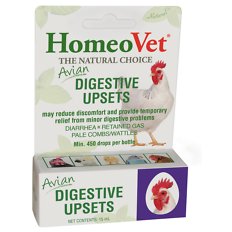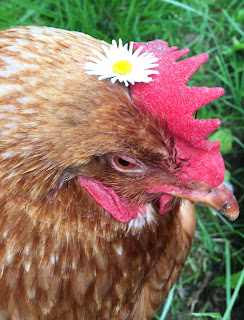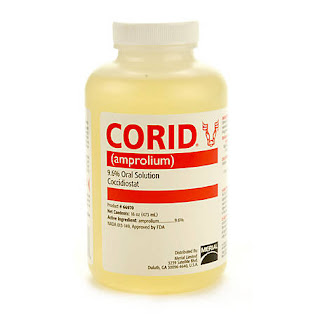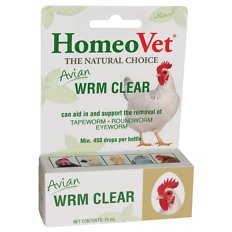It can be challenging to figure out how to help a sick hen get better, especially if you don't have a veterinarian who can assist you. After 8 years of raising chickens and ducks, we struggle with it every time. In some cases, old age is the culprit, but we've also had the good fortune of finding a few things that seemed to work when there is an illness or injury. I like to document what we've attempted to make it easier to remember the next time around; but also, it's good to share ideas to try to help others. So, here are 10 ideas we've tried that helped our sick or injured hens get better.
She even drank water later this evening, after consuming this warm rice-electrolyte-medicine mixture. I had put some Corid in it (see tip #4).
1. Feed the sick hen a raw egg, freshly laid, clean, and still warm from the nest.
Have you ever noticed what happens when an egg accidentally breaks around your hens? They go nuts. They fight over it, gobbling it up as fast as they can. When we had a sick hen, it occurred to me that perhaps the best nutrition I could offer her was an egg. Most of the time, articles say to scramble the egg first to avoid salmonella or any other germs that could harm their digestion. But, really, they do eat the raw eggs whenever they've broken and we're not there to take it away. They want the raw egg. Our sick hens don't want to eat scrambled eggs. So, when our Gold Sex Link hen, Big Bird, was on her last legs and I knew she probably wouldn't make it much longer, I fed her a warm raw egg that was freshly laid. I picked one that was super-clean and cracked it open into a small, clean bowl. She perked right up and went for the egg yolk. I was impressed that she ate half of it right then and there. This hen had stopped eating and drinking for a full day. She slowly got better after that.
They say not to crack open eggs around your hens because it will cause them to start eating their eggs on a regular basis. So, I turn the other way to do it. We've never had a hen start eating her eggs, even though we feed them a raw egg every once in a while.
2. Feed the sick hen some cooked rice with powdered electrolytes and any other medicine you want to give her.
Sadly, chickens stop drinking at some point when they are ill. When that happens, it's nearly impossible to get medicine into them. But, present the sick hen with freshly cooked rice, still warm from the pot, with a little bit of medicine and electrolytes mixed in, and chances are she will eat it enthusiastically. This worked when Big Bird fell ill a second time. Unfortunately, she is an old hen that's past her life expectancy. We're still waiting to see if she will recover. The rice helped her when nothing else seemed to interest her anymore.
There isn't enough nutrition in rice to sustain a hen. So, this treat can just be used to get her interested in eating again. Maybe mix in some egg or crush up some of their chicken feed and stir that in.

3. Feed the sick hen good-quality berry yogurt.
Chickens love to eat fruit-flavored yogurt. Ours like blueberry best. Yogurt is good toward the beginning of their illness when they are still interested in eating. It can help balance their gut by introducing probiotics. And, it's soft and easy to eat. If the sick hen's crop seems hard, it's a soft ingredient they can eat that may help things start moving again. Make sure to pick a high-quality yogurt that doesn't contain high fructose corn syrup or indigestible sugar alternatives.
4. Try giving the hen medicine.
Coccidiosis is a common illness among hens, and a treatment you can give them for this is Corid (Amprolium). We purchased this as a liquid 9.6% oral solution. I add a tiny amount (only about 1/2 teaspoon) per gallon of drinking water for all the hens. However, your sick hen needs to be able to drink to take it, so if the hen is refusing liquids but still eating, I've actually put a tiny amount on food (like warm cooked rice).
Usually, you can find Corid at Coastal Farm and Ranch.
Otherwise, the other treatments I use if I notice my hens seem to be having any digestive or breathing issues are the following:
Digestive Upsets by HomeoVet. I put a few drops of this in their water bowls every day for a few days to a week when I notice they seem unwell. I found this homeopathic treatment at Chewy.com.

Wrm Clear by HomeoVet. Just like with the Digestive Upsets formula, I add a few drops of this to their water for a few days in a row. I bought this at Chewy.com as well. Chewy has a whole line of products for farm animals.
Another food you can give chickens to help with worm prevention is pumpkin. They love to eat pumpkins, both cooked and raw. Something about pumpkins creates an inhospitable environment in their digestive tracts for worms. If you grow pumpkins or you buy them in the fall, cook them and then put the mashed pumpkin in containers in your freezer so you can serve it to them throughout the rest of the year. Just take it out, warm it up, and put it out in their feeding area. They will eat it up.
Ivermectin paste (typically for horses). If your chicken has gapeworm, ivermectin paste works like a charm at killing these nasty parasites. But, you have to be exceptionally careful not to give the chicken too much ivermectin as it can kill her if she is overdosed! I buy ivermectin in a tube at Walmart and when I'm dosing a chicken, I take a teaspoon and put yogurt on it first. Then, I add a teeny-tiny smidge of ivermectin to the middle of the yogurt on the spoon. And I mean a tiny smidge, like maybe one-sixteenth of an inch squeezed out of the tube. The tiniest speck! Then, I take the spoon of yogurt with the smidge of ivermectin on it out to the sick hen and hold it right in front of her beak. She will eat it easily. Gapeworm is easy to identify because the hen will look like she is choking fluid. She will hold her head up with her mouth open and her beak pointed to the sky. She will also cough and sneeze a lot. You need to act quickly if a hen has gapeworm, because it means she is going to die otherwise due to worms in her trachea. She will choke and strangle and die from lack of oxygen. It is very serious. I've had a hen get it three times, and cured it each time with the ivermectin. Gapeworm exists in the soil and in their water bowl, and once a hen gets it, she can become reinfected before the gapeworm disappears for the season. So, I always keep ivermectin in my animal medicine basket in case it's needed.
Please be aware that there is typically a period after giving a hen a strong medicine during which you should not consume her eggs. This prevents you and your family from being affected by the medicine that is present in her system and that gets into her eggs.
5. Allow the hen some time to free-range.
We keep our hens in a chicken run that's quite large but has been picked clean by our hens. You know how that is. They're like roto-tillers out there scratching up the dirt all day long so that nothing ever grows. Since there are bald eagles and other wild animals around that would eat our hens, we have to keep them in a safely contained area. But, when a hen is ill, we've found that an hour here and there out free-ranging does her well. We go outside and enjoy the day with her. Mother Nature knows best how to feed her hens. The hen will scratch around and eat this and that, getting nutrients that otherwise are not available in the chicken run.
6. If you're not worried she'll infect the other hens, allow her to stay with the flock.
I'm going to go out on a limb here. Most articles say not to do this because your other hens might get sick. But, hens are social creatures. They get really sad, worried, and even scared if they're separated from the flock. At times, they may even draw comfort from the other hens. I once saw our Americauna hen, Little White Bird, crawl into a nest with a broody hen when not feeling well. Little White Bird literally stuck her head under the other hen's wing and slept for a few hours that way. Later that day, she had perked up and was just fine.
If you're worried about keeping the ill hen with the others, are you able to arrange it so she can see them from a distance? We've found that our sick hens have more interest in eating and moving around if there are other hens nearby. Perhaps it's companionship or even competition that keeps them interested in trying.
If you do choose to keep the sick hen with the rest of the flock, it's a good idea to treat them all with the same medicine, supplements, or other healthy foods that you're feeding the sick hen. That way, all of their immune systems are boosted, so they can also fight off the illness. But again, you have to consider that the other hens may contract the illness. That's why they always say to quarantine the sick hen. Use your own judgment based on your personal values and preferences.
7. Check on the sick hen and feed her every few hours.
We keep trying different foods every few hours. It seems like a lot of effort, but it's paid off. Just like humans who are ill, it's hard to find foods that sound good when you don't feel well. Also, the raw or cooked foods you're feeding her may spoil sitting out there in the heat of the day, so it's good to replace the food often.
8. If the sick hen is injured, put her in a box that has ventilation to keep her from moving around a lot.
We have a wooden box that has air holes in it - I think it used to be a toolbox for Boeing. It's served as a nesting box for many years now. We cut a hole in the front of it so hens could come and go, but we've also placed the side with the hole against a wall so chickens can't get out. Since it has a lid, it can serve as a nighttime quarantine spot for a hen that needs to keep still due to injury. For example, one day our Buff Orpington hen, Cress, strained her leg and was limping. Nothing seemed broken; I suspected it was a sprain. It was nearly bedtime, so I put a small amount of anti-inflammatory cream (Voltarin; it's actually made for humans) on her leg and stuck her in the wooden box. She was closed up in there overnight on a cool evening. In the morning, we let her out and she was just fine with no more limping.
9. Feed the hen dandelion greens and other weeds that are safe for chickens.
Mainly, we feed dandelion greens since they are a safe choice for hens and everyone in the family is good at identifying these weeds. Dandelions are nutritious and hens love to eat them. Our hens also love to eat the seeds off the top of grass (their beaks pluck it off the blade of grass), and they eat grass that is tender and new. Don't feed old, tough grass or any weeds that may upset their digestive systems or that are poisonous. That's why we mainly stick with dandelions. They are plentiful in most lawns. Also, make sure you're not feeding them anything from your lawn if you've treated it with chemicals of any kind.
10. If the other hens are being competitive about food, separate the sick hen just while she's eating so she gets as much food as possible.
While we tend to leave our sick hen with the flock most of the time, we will separate her while she's eating. That way, the other hens don't eat it all up before she gets any. Chickens love to get treats and in their exuberance gobble up as much as they can. Unfortunately, that means those that are not feeling as well or are elderly will get left out.
I realize it sounds like we have a lot of sick hens, but we don't. This is just 8 years' worth of trying when the hens have had upset tummies, colds, strained legs, and generally declining health from old age. We do our best to help them along. I hope these ideas will help others. If you have additional ideas to offer, we would love for you to share them in the comments section below.
Disclaimer Notice
The content of the Vintage Home and Farm website, blog, and all social media are for informational purposes only and are not intended to be a substitute for professional veterinarian advice, diagnosis, or treatment. Dependence on any information appearing on the Vintage Home and Farm website, blog, and social media sites is entirely at your own risk. Please do your own research and make your own informed decisions regarding the health of your chickens and ducks.





Thank you for your advice. It saved one of our sex link chickens! She was looking and acting poorly. I found your blog and tried the fresh raw egg and it was like a miracle. Took 2-3 days as you mentioned and now she is back to her old self. Thanks so much and God bless!
ReplyDelete